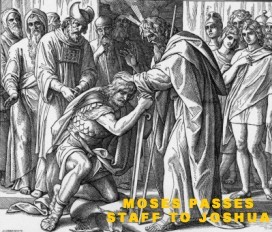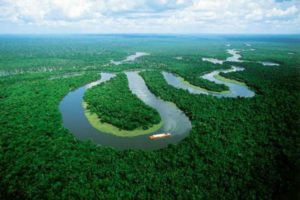LAWS OF INHERITANCE; ORDINATION OF JOSHUA; JOHN THE BAPTIST AND JESUS
THE LAW OF INHERITANCE
The Promised Land would be divided for an inheritance among the twelve tribes, according to their respective sizes –the number of fighting men listed in the census (Numbers 26:53).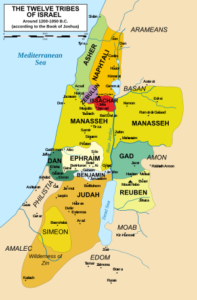
The largest tribe would receive the largest inheritance, and the smallest tribe, the smallest inheritance.
As we read through the Bible, we will notice that the sizes of the tribes fluctuate. At the time of the census taken before entering Canaan, Judah is the largest tribe, with 76,500 fighting men. By the time Saul is appointed King, Benjamin is the smallest.
One cannot help but notice that the tribe of Simeon was drastically reduced from 59,300 to 22,200, when comparing the first census taken at the beginning of the wilderness journey to the one at the end. It is ironic that the plague that killed 24,000 Israelites, which was a punishment for the sin of Baal worship and immorality at Peor, was arrested with the death of Zimri, of the tribe of Simeon who brought Cozbi, the Midianite woman into his family’s tent (Numbers 25:3-15). Perhaps the plague struck close to the tent of Zimri.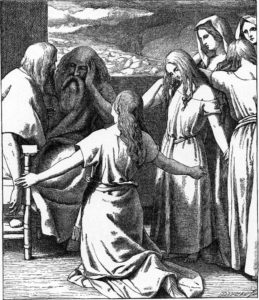
The Levites, numbering 23,000, did not receive an inheritance of land, for the Lord Himself was their inheritance (Deut. 18:2). They were to serve as priests in the cities and were to be supported by tithes provided by the other tribes possessing land (Numbers 26:57-62).
Zelophehad, of the tribe of Manasseh, had no sons to legally inherit his land after his death (Numbers 26:33). He died in the wilderness with five surviving daughters. According to existing customs, they could not receive his land as an inheritance because they were women. His daughters boldly made their legitimate argument to Moses that their father’s name be not forgotten and therefore requested that his land be passed on to them. Moses brings the case before the Lord who answers in their favor. A law is given that defines that if a man has no sons to inherit his property, it is to be inherited by his daughters before any option is exercised to pass it on to any other male relative (Numbers 27:1-11).
Moses is told by the LORD that he is soon to die and be gathered to his people (Number 27:13). However, he will not die before seeing the Promised Land from the heights of the Mountain of Abarim (Nebo). The LORD reminds him once again that the reason he will not enter the Promised Land is because of his rebellion in which he misrepresented the Lord and His holy command at the waters of Meribah. The Good News is that, by God’s grace, centuries later, we see Moses in the Promised Land with Jesus, the greater Joshua, on the Mount of Transfiguration! (Matthew 17:3; Mark 9:4; Luke 9:30-31)
Moses requests that the LORD, whom he calls here, “The God of the spirits of all flesh”, appoint his successor in order that the people of Israel might not become sheep without a shepherd. The leadership responsibility requires one who knows how to ascertain the mind of the Lord (to go out and come into the Lord’s presence) before the people, and one who is able “to lead them out and bring them in” (Numbers 27:17). Moses was aware that he was able to lead them out of Egypt but, due to his disobedience, he was not able to bring them into Canaan.
Moses is told by God to ordain Joshua. Ordination is to bring official recognition to a person’s function. It means “to put in order”. Joshua is to be singled out among the people with the laying on of hands. The Spirit was already upon Joshua and now Moses was to officially delegate authority to him, by ordaining him. This affirmation causes him to stand in the appointed function of leader in the presence of the people. Joshua is to be commissioned “in their sight” (Numbers 27:19).
The LORD tells Moses that Joshua is to stand before Eleazar, the priest, who will make inquiries to the Lord on the basis of the Urim and Thummin. This would be a different leadership role and a more indirect means whereby Joshua would come to determine God’s will. Moses and the Lord spoke with each other face to face as a man speaks with a friend (Exodus 33:11). Joshua would receive revelation by means of the Urim and Thummin held by the priest.
Moses is still mediator of the covenant in his last days. Joshua has a different function as the one who leads the people into the inheritance allotted to them on the basis of the finished work of redemption mediated through the Great High Priest.
In Chapter 28, the Lord gives instructions about public sacrifices, food offerings, and, in particular, the continual burnt offerings with the drink offerings.
NEW TESTAMENT READING: LUKE 3:1-22
John the Baptist is another person in the gospel story whose life is attested to in extra-Biblical histories.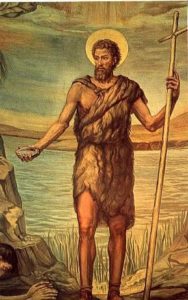
For example, all existing copies of “Jewish Antiquities”, written by the Hebrew historian Flavius Josephus (37-100 AD), contain passages on John the Baptist. The following appears in Book 18, Chapter 5.
“Now some of the Jews thought that the destruction of Herod’s army came from God, and that very justly, as a punishment of what he did against John, that was called the Baptist: for Herod slew him, who was a good man, and commanded the Jews to exercise virtue, both as to righteousness towards one another, and piety towards God, and so to come to baptism; for that the washing [with water] would be acceptable to him” (Flavius Josephus, Jewish Antiquities, Book 18, 5,2).
The preaching of John the Baptist went for the jugular. He called for repentance not just of sins, (the fruit of the tree) but a recognition of the corruption within, the sin nature (the root of the tree).
Luke 3:9 “Indeed the axe is already laid at the root of the trees; so every tree that does not bear good fruit is cut down and thrown into the fire.”
The law reveals the corruption at the root in Adam’s race and brings it under condemnation. We are to repent of any and all self-righteousness, including our human religions and various philosophies of self-redemption.
We must prepare the way for the Lord. His paths are straight. High mountains of pride need to be leveled. Those whose sins have put them in deep ravines of shame need to hear the good news of the salvation of our God: “Behold the Lamb of God who takes away the sin of the world” (John 1:29).
John the Baptist recognized the reality of God’s wrath against sin. Our own conscience also warns us of this. Any claim of being exempt from God’s justice that demands the penalty of sin must be forsaken. Our own works of righteousness or pedigree cannot save us.
John the Baptist calls people to deep repentance in order that they might see how deeply sin resides in the human heart.
John describes how a heart attitude of repentance towards God will be evident in changed behavior- works of repentance. To the rich he says- Give away your excess clothes and food. To tax collectors- collect no more than you have been ordered to collect. To the soldiers- Do not take money from anyone by force, do not accuse anyone falsely, and be content with your wages. To Herod- he says “You are in trouble. You have taken your brother’s wife as your own. Repent. Prepare the way of the Lord”.
Then the big question is asked: Was John the Christ? ‘No’, he replies. John baptizes with water; but Jesus is mightier, and, according to John, more worthy. He will baptize with the Holy Spirit and fire.
John explains the baptism of the Spirit and of fire in the verse that follows. Those who live through the Spirit in the end will be gathered as wheat. Those who live in the flesh are subject to the fire of judgment. (Remember the parable of the wheat and the tares! Matthew 13:30)
“His winnowing fork is in His hand to thoroughly clear His threshing floor, and to gather the wheat into His barn; but He will burn up the chaff with unquenchable fire” Luke 3:17 (NASB).
THE BAPTISM OF JESUS-
Luke’s account is short and to the point: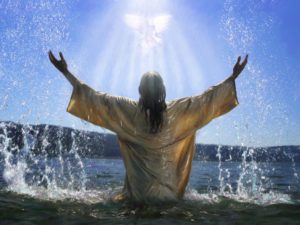
21 Now when all the people were baptized, Jesus was also baptized, and while He was praying, heaven was opened, 22 and the Holy Spirit descended upon Him in bodily form like a dove, and a voice came out of heaven, “You are My beloved Son, in You I am well-pleased”
Luke 3:21-22 (NASB).
Jesus is commended by the Father’s voice and the Holy Spirit’s presence.
While He was praying, the heaven was opened. As we are identified in a faith-union with Christ, we find that we are accepted, indwelt by the presence of His Spirit, and have the gift of an open heaven. It is freely given to those who believe the gospel and thereby are found in Him.
READING FROM THE PSALMS –PSALM 61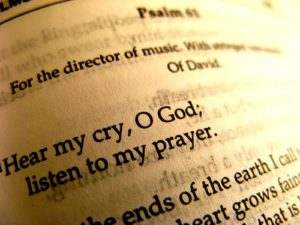
“When my heart is overwhelmed
Lead me to the rock that is higher than I!” (Ps. 61:2)
David is feeling far from home. “From the ends of the earth will I cry out unto you!” Once again God is referred to as “The Rock”. His trustworthiness is solid. The Lord is unshakeable.
When we are faced with difficulties, we should not be drawn in to our emotions, surrendering to our fears or despair. Nor should we seek reliance upon our own strength or wisdom. The emphasis here is not only on the Rock as a place of refuge but as a place of elevation.
We need to be delivered from viewing things merely from our ‘natural eye level’ and accept our identification with Christ, our Rock (1 Cor 10:4). We are dead, and our lives are hid with Christ in God (Colossians 3:3). We are raised together with Him and seated together with Him in the heavenly places. From this vantage point we see that ultimately; He has given us deliverance. No enemy from without or within, no outer foe or inner fear, can separate us from the reality of the victory that has been won for us in Christ.
PROVERB FOR TODAY
Proverbs 11:16-17 (NASB) 16 A gracious woman attains honor, and ruthless men attain riches.
17 The merciful man does himself good, But the cruel man does himself harm.
Graciousness, mercifulness, compassion and kindness are rewarded with riches that are far superior to those gained by the self-interested business person. One will ultimately win lasting respect and treasures in heaven, while the other will find that any apparent worldly success will have been sabotaged by their own greed and selfishness.
PRAYER FOR THE NATIONS
Continuing to Pray for Brazil “Operation World” (Pages 167-169)
THE INDIGENOUS AMERINDIANS have endured centuries of prejudice, oppression, massacre and exploitation, which continue to this day by encroaching woodcutters, gold prospectors and ranchers. Their unique cultures are disintegrating through despair, disease, substance abuse and suicide. Six million indigenous people in AD 1500 now number a mere 700,000 with many reduced to small bands in inaccessible areas. The large majority of these tribal groups now number less than a 1,000 people. Fully 70% of Brazil’s unevangelized peoples live in the Amazon basin.
Pray for:
- A Change in attitude of Brazilians to see these people as national treasures rather than nuisances who slow the rapid but shorthanded development in the Amazon and Pantanal. Government laws and policies are in place to prevent exploitation of people and land, but they have not been effectively implemented.
- A balanced approach to protection that actually helps the Amerindians. Their isolation has yielded their immune systems highly vulnerable to outside diseases. But occasionally, those (self) appointed to “protect” them instead perpetuate their misery by enforcing their isolation and preventing their own appropriate development and integration into the wider world.
- The growth of Christian networks among these people. CONPLEI (National Counsil of Evangelical Indigenous Pastors and Leaders) is a rapidly expanding indigenous, evangelical movement for tribal groups. CONPLEI gatherings host over 1,000 Amerindian evangelical leaders from around 50 tribal groups.
- Christian agencies ministering to them. Pray for New Tribes Mission with 500 staff and missionaries working with 36 tribes, hoping soon to reach another 9. Pray for WEC, YWAM and other agencies reaching the Amerindians. Pray that the gospel be shared in a way that honors and preserves the culture while elevating Christ. There are 103 tribal groups with no missionary presence.
- Bible translation and Scripture use. There are projects in 45 languages but a further 10 languages need Scripture translation, and many language groups need Scripture-use projects.
- Urbanized and detribalized Amerindians are a new missiological challenge. Increasingly many groups migrate into cities, where they experience great cultural disorientation and exploitation. Without necessary labor or language abilities, they gravitate toward menial labor, destitute slums and, too often, crime.
PRAYER: Heavenly Father, we are grateful that You have authored a greater Exodus and made a way for us to be delivered from bondage to the fear of death through Christ our Passover. He, who provided a greater deliverance, is our greater Moses, our greater High Priest and our greater Joshua. He fulfills all that is promised and brings us into its experience. He is our rock and our high tower. We thank You for the Holy Spirit who lifts us up upon the Rock to realize a ‘higher’ heavenly perspective as He communicates the Word, the mind of Christ. Make us ever mindful of Your grace and mercy! And make us gracious and merciful in Jesus’ Name. Amen
Pastor David
So, naturally, we proclaim Christ! We warn everyone we meet, and we teach everyone we can, all that we know about him, so that, if possible, we may bring every man up to his full maturity in Christ. (Colossians 1:28, J.B. Phillips paraphrase)
New Life Community Church, Concord, MA 10742
www.newlife.org

